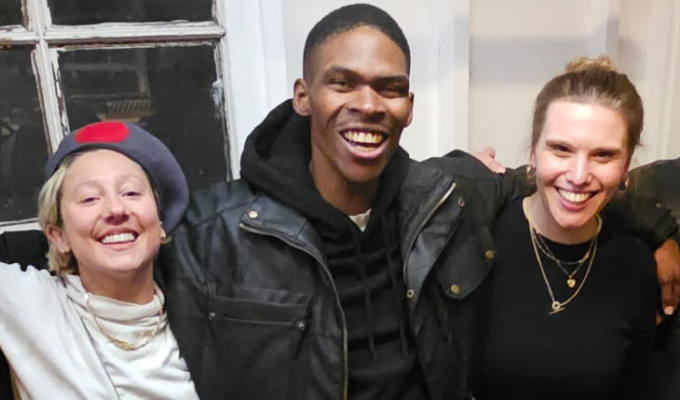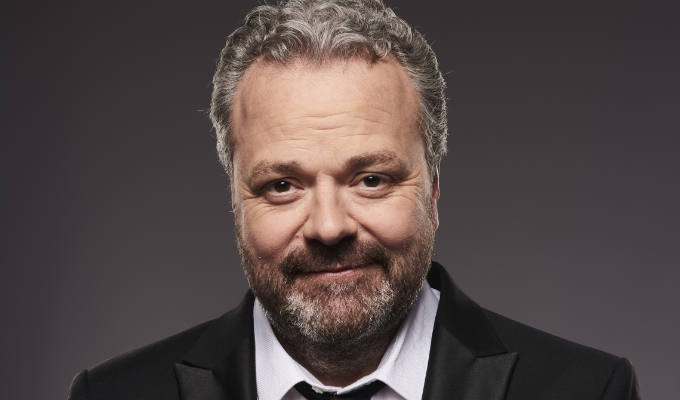
Bristol Comedy Competition Semi-Final One
New acts at a new festival
Bristol has always punched above its weight when producing comedians, and the city’s new comedy festival – in addition to the big-name Comedy Garden and vintage Slapstick Festival celebrations – aims to nurture the already fruitful grassroots scene.
So of course there’s a new act competition, and although its 240 entrants came from beyond the BS postcodes, the first, well-attended, semi-final at the newly opened Gaffe Comedy Club showcased a varied range of promising acts. But it did end on a very strange note…
First up was Daisy Doris May, in character as Steve Porters, ‘legendary iPod DJ’ and ardent pick-up artist, despite being so clearly all mouth and little action.
This sort of would-be alpha male might be easy to mock, but May brings a verve and flair to her dynamic performance, while having the character torn between a toxic masculinity and a softer side that wants to do the right thing. His clumsily excitable laddishness has charm, while the insecurity under the surface softens the edges. Meanwhile May’s physicality and lively crowd work vitalise the room, and certainly helped earn her a place in Friday’s final.
Omari Douglas’s energy is the polar opposite, with the sort of still deadpan pioneered by Norman Lovett as he says nothing and does very little for the first 30 seconds or so. It seems like a lifetime, before being punctuated in a wonderfully silly way.
That sense of daftness underpins much of his set, though it’s conveyed with a still gravitas. The room’s silent apart from the hum of the air-conditioner as he delivers his set-ups, testament to his ability to hold an audience (though that nothingness will surely be harder to sustain over a longer set) before sharing his absurdities. He was to be the audience’s choice to go through – a 100 per cent hit rate for the first two acts of the night.
From her very first joke – an excellent one – Jess Lo makes much capital from the differences in culture between Britain and her native China. However, she doesn’t push much beyond the usual tropes about boozing and bad cuisine, and when she does - talking about Sheffield bus drivers’ propensity to call her ‘love’, for example – the results are mixed. A sign, I’m sure, of her relative inexperience – as was her fumbling of a punchline. But she’s an endearing presence, with flashes that show her potential.
Charlie Bowers is even more of an anti-comedian than Douglas, with meandering, mundane stories of supermarket encounters and eating soup. ‘I don’t do big hitters,’ is his disclaimer, and he makes much of the common comedian’s line of giving each audience member a laugh, one at a time.
Yet his low-key persona slowly wins the crowd round and the trivialities eventually yield to material that starts to resemble more identifiable jokes. He’s making something of a name for himself online – mainly by parodying TikTok’s cryptic crossword king, Angas Tiernan – but it looks like he has legs in the live arena, too.
Kerry Thompson tells us he’s a dad, though he barely needs to, given that much of his set falls firmly into the ‘dad joke’ category, with the usual mix of groaners and one-liners you can – grudgingly – admire for their wordplay. Often both in the same gag.
He doesn’t take himself too seriously and the affability is infectious, even when the occasional routine doesn’t quite fire. His talk about feeling like a non-playable characters, for example, doesn’t deviate from the established meme. But Thompson moves along briskly enough, that something different is always along soon.
Emmanuel O has the sort of assured delivery that instils confidence in an audience, enhanced by the mini-conversations he has with the crowd. His material, however, is more of a mixed bag. Griping about his housemates seems more like grievance-airing, with the final punchline not justifying the long build-up.
And a routine about ‘period sex’ exists more to get an icky shock reaction than laughs, despite his supposedly positive stance. It’s all just a bit too loose, without much impetus to hit the next laugh, a shortcoming only partially covered by his on-stage poise.
June Tuesday brings oodles of chaotic energy to the stage, describing herself as ‘trans and toxic’ and probably bipolar as well. While her very existence might be considered political, that’s not what interests her, instead professing to be ‘dumb’ – and certainly more interested in oversharing details of her personal life than anything issues-based.
While her haywire energy is appealing, it’s also a bit disorienting as she jumps from one topic to another. Squaring that so she’s more consistent without losing the mayhem will be key to her comedy career.
Energy is also Emma Hughes’s forte, with a unhinged intensity that’s weirdly compelling, She very much knows how she comes across, and has a great analogy to explain it, among a flurry of good gags about her physical abnormalities.
‘Odd but safe’ is her self-assessment, and it would be hard to disagree with this likeable over-the-top act. Funny, too, and she secured the third place in the final.
Finally Paul Hilleard, painting a whimsical picture of the strange people in his native Pontypridd, in the Rhondda Valley. Until, that is, he announced that he’d screwed up a joke a couple of minutes in – not that anyone else had noticed – and proceeded to sabotage his set.
He turned his attentions to a woman in the front row he’d seen chatting to her friend during some of the other comedians’ sets, as well as his own. Poor form for an audience member certainly, though equally a lot of people in the room – myself included – would have been entirely unaware of any disruption.
Hilleard used his stage time to insist that the woman issue a fulsome apology to all the other acts on the bill, causing much awkwardness all round. There were laughs, perhaps nervous, perhaps triggered by the audacity of a comic squandering his stage time to browbeat a punter
‘I don’t need this,’ he explained at one time. ‘I’ve won a much bigger competition’ – a reference to him taking the BBC New Comedy Award title last year.
Was he a hero for standing up for his colleagues and audience members who might have been put off by her chatter? Or reckless for almost derailing the gig? Probably some of both, although it was lucky no one else had to follow him. He certainly provided a talking point from the show, that much is true.
» Read the review of the second semi-final here.
Review date: 23 Jan 2025
Reviewed by: Steve Bennett
Reviewed at:
Bristol The Gaffe Comedy Club






